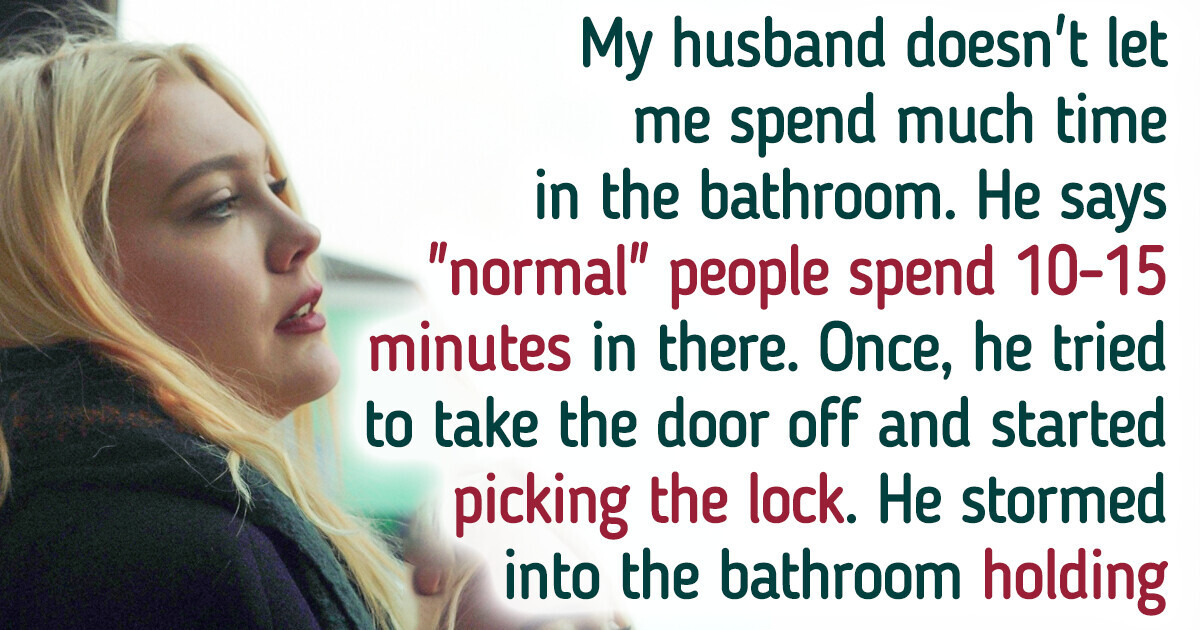My Husband Picks the Bathroom Lock When I Spend “Too Much Time” in the Shower

When trust erodes in a relationship, even the simplest daily routines can become battlegrounds. One reader shared her story of how her husband’s intense jealousy has turned something as mundane as taking a shower into a source of constant conflict. His unfounded suspicions have led to controlling and intrusive actions that violate her privacy in deeply disturbing ways. Here’s her story:
“My husband limits my bathroom time to 10-15 minutes, claiming that ‘normal’ people don’t need any longer. If I exceed that, he accuses me of using the extra time to secretly text or call other men. His paranoia has gotten so extreme that he listens outside the door, and if he hears anything he deems ‘suspicious,’ he bangs on the door, demanding answers.
One evening, after a particularly stressful day at work, I decided to take a longer shower—about 30 minutes—to unwind. Almost immediately, my husband began shouting, ‘What’s taking so long?’ Despite explaining that I was nearly done, he didn’t believe me. To my shock, he began trying to remove the door from its hinges, even picking the lock. Then he barged in, phone in hand, recording me. Thankfully, I was already dressed, but he told me he was trying to catch me cheating and planned to use the video as proof. I’m at my breaking point. How can I make him understand this behavior isn’t normal?”
Thank you for sharing such a deeply personal and difficult experience. We’re truly sorry you’re going through this, and here’s some advice to help you navigate this challenging situation:
1. Establish Firm Boundaries
His behavior is not only inappropriate, but it’s also deeply invasive. It’s critical that you clearly communicate that this level of control and violation of your privacy is unacceptable. Everyone deserves space and autonomy, and the constant monitoring needs to stop. Let him know that if he continues to disregard your boundaries, you may have to seriously reconsider whether this relationship is healthy for you.
2. Confront the Root of His Distrust
Your husband’s actions signal a serious trust issue that needs to be addressed head-on. Sit down with him and ask why he feels the need to monitor your every move or jump to conclusions without evidence. While reassurance may help in the short term, it’s essential to emphasize how damaging his baseless accusations are to your relationship. Couples therapy could provide a structured environment to unpack and confront these issues with professional guidance.
3. Recognize the Red Flags
What you’re experiencing goes beyond simple insecurity—it’s controlling and toxic. Constant accusations, invasion of privacy, and restrictions on how you spend your time are clear signs of an unhealthy dynamic. You deserve to feel respected and safe in your home. It’s important to evaluate if this relationship is offering you support and happiness, or if it’s causing more emotional harm than good.
4. Document His Behavior
If this situation continues to escalate, it’s essential to document these incidents. Keep a detailed record of his controlling behavior, including dates and specific actions. If things become more aggressive or threatening, don’t hesitate to seek help from outside sources. Your safety and well-being are paramount, and if necessary, contact authorities for protection.
We understand how overwhelming and difficult this situation is, and we hope these steps guide you toward a place of peace, safety, and self-empowerment.